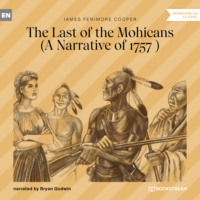
Полная версия
Pathfinder; or, the inland sea
"This comes of getting things wrong end foremost," answered Cap, with a condescending nod. "You have thought of your lakes and rifts as the ship; and of the ocean and the tides as the boat. Neither Arrowhead nor the Serpent need doubt what you have said concerning both, though I confess myself to some difficulty in swallowing the tale about there being inland seas at all, and still more that there is any sea of fresh water. I have come this long journey as much to satisfy my own eyes concerning these facts, as to oblige the Sergeant and Magnet, though the first was my sister's husband, and I love the last like a child."
"You are wrong, friend Cap, very wrong, to distrust the power of God in any thing," returned Pathfinder earnestly. "They that live in the settlements and the towns have confined and unjust opinions consarning the might of His hand; but we, who pass our time in His very presence, as it might be, see things differently—I mean, such of us as have white natur's. A red-skin has his notions, and it is right that it should be so; and if they are not exactly the same as a Christian white man's, there is no harm in it. Still, there are matters which belong altogether to the ordering of God's providence; and these salt and fresh-water lakes are some of them. I do not pretend to account for these things, but I think it the duty of all to believe in them."
"Hold on there, Master Pathfinder," interrupted Cap, not without some heat; "in the way of a proper and manly faith, I will turn my back on no one, when afloat. Although more accustomed to make all snug aloft, and to show the proper canvas, than to pray when the hurricane comes, I know that we are but helpless mortals at times, and I hope I pay reverence where reverence is due. All I mean to say is this: that, being accustomed to see water in large bodies salt, I should like to taste it before I can believe it to be fresh."
"God has given the salt lick to the deer; and He has given to man, red-skin and white, the delicious spring at which to slake his thirst. It is unreasonable to think that He may not have given lakes of pure water to the west, and lakes of impure water to the east."
Cap was awed, in spite of his overweening dogmatism, by the earnest simplicity of the Pathfinder, though he did not relish the idea of believing a fact which, for many years, he had pertinaciously insisted could not be true. Unwilling to give up the point and, at the same time, unable to maintain it against a reasoning to which he was unaccustomed, and which possessed equally the force of truth, faith, and probability, he was glad to get rid of the subject by evasion.
"Well, well, friend Pathfinder," said he, "we will leave the argument where it is; and we can try the water when we once reach it. Only mark my words—I do not say that it may not be fresh on the surface; the Atlantic is sometimes fresh on the surface, near the mouths of great rivers; but, rely on it, I shall show you a way of tasting the water many fathoms deep, of which you never dreamed; and then we shall know more about it."
The guide seemed content to let the matter rest, and the conversation changed.
"We are not over-conceited consarning our gifts," observed the Pathfinder, after a short pause, "and well know that such as live in the towns, and near the sea—"
"On the sea," interrupted Cap.
"On the sea, if you wish it, friend—have opportunities which do not befall us of the wilderness. Still, we know our own callings, and they are what I consider natural callings, and are not parvarted by vanity and wantonness. Now, my gifts are with the rifle, and on a trail, and in the way of game and scouting; for, though I can use the spear and the paddle, I pride not myself on either. The youth Jasper, there, who is discoursing with the Sergeant's daughter, is a different cratur'; for he may be said to breathe the water, as it might be, like a fish. The Indians and Frenchers of the north shore call him Eau-douce, on account of his gifts in this particular. He is better at the oar, and the rope too, than in making fires on a trail."
"There must be something about these gifts of which you speak, after all," said Cap. "Now this fire, I will acknowledge, has overlaid all my seamanship. Arrowhead, there, said the smoke came from a pale-face's fire, and that is a piece of philosophy which I hold to be equal to steering in a dark night by the edges of the sand."
"It's no great secret," returned Pathfinder, laughing with great inward glee, though habitual caution prevented the emission of any noise. "Nothing is easier to us who pass our time in the great school of Providence than to larn its lessons. We should be as useless on a trail, or in carrying tidings through the wilderness, as so many woodchucks, did we not soon come to a knowledge of these niceties. Eau-douce, as we call him, is so fond of the water, that he gathered a damp stick or two for our fire; and wet will bring dark smoke, as I suppose even you followers of the sea must know. It's no great secret, though all is mystery to such as doesn't study the Lord and His mighty ways with humility and thankfulness."
"That must be a keen eye of Arrowhead's to see so slight a difference."
"He would be but a poor Indian if he didn't. No, no; it is war-time, and no red-skin is outlying without using his senses. Every skin has its own natur', and every natur' has its own laws, as well as its own skin. It was many years before I could master all these higher branches of a forest education; for red-skin knowledge doesn't come as easy to white-skin natur', as what I suppose is intended to be white-skin knowledge; though I have but little of the latter, having passed most of my time in the wilderness."
"You have been a ready scholar, Master Pathfinder, as is seen by your understanding these things so well. I suppose it would be no great matter for a man regularly brought up to the sea to catch these trifles, if he could only bring his mind fairly to bear upon them."
"I don't know that. The white man has his difficulties in getting red-skin habits, quite as much as the Indian in getting white-skin ways. As for the real natur', it is my opinion that neither can actually get that of the other."
"And yet we sailors, who run about the world so much, say there is but one nature, whether it be in the Chinaman or a Dutchman. For my own part, I am much of that way of thinking too; for I have generally found that all nations like gold and silver, and most men relish tobacco."
"Then you seafaring men know little of the red-skins. Have you ever known any of your Chinamen who could sing their death-songs, with their flesh torn with splinters and cut with knives, the fire raging around their naked bodies, and death staring them in the face? Until you can find me a Chinaman, or a Christian man, that can do all this, you cannot find a man with a red-skin natur', let him look ever so valiant, or know how to read all the books that were ever printed."
"It is the savages only that play each other such hellish tricks," said Master Cap, glancing his eyes about him uneasily at the apparently endless arches of the forest. "No white man is ever condemned to undergo these trials."
"Nay, therein you are again mistaken," returned the Pathfinder, coolly selecting a delicate morsel of the venison as his bonne bouche; "for though these torments belong only to the red-skin natur', in the way of bearing them like braves, white-skin natur' may be, and often has been, agonized by them."
"Happily," said Cap, with an effort to clear his throat, "none of his Majesty's allies will be likely to attempt such damnable cruelties on any of his Majesty's loyal subjects. I have not served much in the royal navy, it is true; but I have served, and that is something; and, in the way of privateering and worrying the enemy in his ships and cargoes, I've done my full share. But I trust there are no French savages on this side the lake, and I think you said that Ontario is a broad sheet of water?"
"Nay, it is broad in our eyes," returned Pathfinder, not caring to conceal the smile which lighted a face which had been burnt by exposure to a bright red; "though I mistrust that some may think it narrow; and narrow it is, if you wish it to keep off the foe. Ontario has two ends, and the enemy that is afraid to cross it will be certain to come round it."
"Ah! that comes of your d——d fresh-water ponds!" growled Cap, hemming so loudly as to cause him instantly to repent the indiscretion. "No man, now, ever heard of a pirate or a ship getting round one end of the Atlantic!"
"Mayhap the ocean has no ends?"
"That it hasn't; nor sides, nor bottom. The nation which is snugly moored on one of its coasts need fear nothing from the one anchored abeam, let it be ever so savage, unless it possesses the art of ship building. No, no! the people who live on the shores of the Atlantic need fear but little for their skins or their scalps. A man may lie down at night in those regions, in the hope of finding the hair on his head in the morning, unless he wears a wig."
"It isn't so here. I don't wish to flurry the young woman, and therefore I will be in no way particular, though she seems pretty much listening to Eau-douce, as we call him; but without the edication I have received, I should think it at this very moment, a risky journey to go over the very ground that lies between us and the garrison, in the present state of this frontier. There are about as many Iroquois on this side of Ontario as there are on the other. It is for this very reason, friend Cap, that the Sergeant has engaged us to come out and show you the path."
"What! do the knaves dare to cruise so near the guns of one of his Majesty's works?"
"Do not the ravens resort near the carcass of the deer, though the fowler is at hand? They come this-a-way, as it might be, naturally. There are more or less whites passing between the forts and the settlements, and they are sure to be on their trails. The Sarpent has come up one side of the river, and I have come up the other, in order to scout for the outlying rascals, while Jasper brought up the canoe, like a bold-hearted sailor as he is. The Sergeant told him, with tears in his eyes, all about his child, and how his heart yearned for her, and how gentle and obedient she was, until I think the lad would have dashed into a Mingo camp single-handed, rather than not a-come."
"We thank him, and shall think the better of him for his readiness; though I suppose the boy has run no great risk, after all."
"Only the risk of being shot from a cover, as he forced the canoe up a swift rift, or turned an elbow in the stream, with his eyes fastened on the eddies. Of all the risky journeys, that on an ambushed river is the most risky, in my judgment, and that risk has Jasper run."
"And why the devil has the Sergeant sent for me to travel a hundred and fifty miles in this outlandish manner? Give me an offing, and the enemy in sight, and I'll play with him in his own fashion, as long as he pleases, long bows or close quarters; but to be shot like a turtle asleep is not to my humor. If it were not for little Magnet there, I would tack ship this instant, make the best of my way back to York, and let Ontario take care of itself, salt water or fresh water."
"That wouldn't mend the matter much, friend mariner, as the road to return is much longer, and almost as bad as the road to go on. Trust to us, and we will carry you through safely, or lose our scalps."
Cap wore a tight solid queue, done up in eelskin, while the top of his head was nearly bald; and he mechanically passed his hand over both as if to make certain that each was in its right place. He was at the bottom, however, a brave man, and had often faced death with coolness, though never in the frightful forms in which it presented itself under the brief but graphic picture of his companion. It was too late to retreat; and he determined to put the best face on the matter, though he could not avoid muttering inwardly a few curses on the indiscretion with which his brother-in-law, the Sergeant, had led him into his present dilemma.
"I make no doubt, Master Pathfinder," he answered, when these thoughts had found time to glance through his mind, "that we shall reach port in safety. What distance may we now be from the fort?"
"Little more than fifteen miles; and swift miles too, as the river runs, if the Mingos let us go clear."
"And I suppose the woods will stretch along starboard and larboard, as heretofore?"
"Anan?"
"I mean that we shall have to pick our way through these damned trees."
"Nay, nay, you will go in the canoe, and the Oswego has been cleared of its flood-wood by the troops. It will be floating down stream, and that, too, with a swift current."
"And what the devil is to prevent these minks of which you speak from shooting us as we double a headland, or are busy in steering clear of the rocks?"
"The Lord!—He who has so often helped others in greater difficulties. Many and many is the time that my head would have been stripped of hair, skin, and all, hadn't the Lord fi't of my side. I never go into a skrimmage, friend mariner, without thinking of this great ally, who can do more in battle than all the battalions of the 60th, were they brought into a single line."
"Ay, ay, this may do well enough for a scouter; but we seamen like our offing, and to go into action with nothing in our minds but the business before us—plain broadside and broadside work, and no trees or rocks to thicken the water."
"And no Lord too, I dare to say, if the truth were known. Take my word for it, Master Cap, that no battle is the worse fi't for having the Lord on your side. Look at the head of the Big Sarpent, there; you can see the mark of a knife all along by his left ear: now nothing but a bullet from this long rifle of mine saved his scalp that day; for it had fairly started, and half a minute more would have left him without the war-lock. When the Mohican squeezes my hand, and intermates that I befriended him in that matter, I tell him no; it was the Lord who led me to the only spot where execution could be done, or his necessity be made known, on account of the smoke. Sartain, when I got the right position, I finished the affair of my own accord. For a friend under the tomahawk is apt to make a man think quick and act at once, as was my case, or the Sarpent's spirit would be hunting in the happy land of his people at this very moment."
"Come, come, Pathfinder, this palaver is worse than being skinned from stem to stem; we have but a few hours of sun, and had better be drifting down this said current of yours while we may. Magnet dear, are you not ready to get under way?"
Magnet started, blushed brightly, and made her preparations for immediate departure. Not a syllable of the discourse just related had she heard; for Eau-douce, as young Jasper was oftener called than anything else, had been filling her ears with a description of the yet distant part towards which she was journeying, with accounts of her father, whom she had not seen since a child, and with the manner of life of those who lived in the frontier garrisons. Unconsciously she had become deeply interested, and her thoughts had been too intently directed to these matters to allow any of the less agreeable subjects discussed by those so near to reach her ears. The bustle of departure put an end to the conversation, and, the baggage of the scouts or guides being trifling, in a few minutes the whole party was ready to proceed. As they were about to quit the spot, however, to the surprise of even his fellow-guides, Pathfinder collected a quantity of branches and threw them upon the embers of the fire, taking care even to see that some of the wood was damp, in order to raise as dark and dense a smoke as possible.
"When you can hide your trail, Jasper," said he, "a smoke at leaving an encampment may do good instead of harm. If there are a dozen Mingos within ten miles of us, some of 'em are on the heights, or in the trees, looking out for smokes; let them see this, and much good may it do them. They are welcome to our leavings."
"But may they not strike and follow on our trail?" asked the youth, whose interest in the hazard of his situation had much increased since the meeting with Magnet. "We shall leave a broad path to the river."
"The broader the better; when there, it will surpass Mingo cunning, even, to say which way the canoe has gone—up stream or down. Water is the only thing in natur' that will thoroughly wash out a trail, and even water will not always do it when the scent is strong. Do you not see, Eau-douce, that if any Mingos have seen our path below the falls, they will strike off towards this smoke, and that they will naturally conclude that they who began by going up stream will end by going up stream. If they know anything, they now know a party is out from the fort, and it will exceed even Mingo wit to fancy that we have come up here just for the pleasure of going back again, and that, too, the same day, and at the risk of our scalps."
"Certainly," added Jasper, who was talking apart with the Pathfinder, as they moved towards the wind-row, "they cannot know anything about the Sergeant's daughter, for the greatest secrecy has been observed on her account."
"And they will learn nothing here," returned Pathfinder, causing his companion to see that he trod with the utmost care on the impression left on the leaves by the little foot of Mabel; "unless this old salt-water fish has been taking his niece about in the wind-row, like a fa'n playing by the side of the old doe."
"Buck, you mean, Pathfinder."
"Isn't he a queerity? Now I can consort with such a sailor as yourself, Eau-douce, and find nothing very contrary in our gifts, though yours belong to the lakes and mine to the woods. Hark'e, Jasper," continued the scout, laughing in his noiseless manner; "suppose we try the temper of his blade and run him over the falls?"
"And what would be done with the pretty niece in the meanwhile?"
"Nay, nay, no harm shall come to her; she must walk round the portage, at any rate; but you and I can try this Atlantic oceaner, and then all parties will become better acquainted. We shall find out whether his flint will strike fire; and he may come to know something of frontier tricks."
Young Jasper smiled, for he was not averse to fun, and had been a little touched by Cap's superciliousness; but Mabel's fair face, light, agile form, and winning smiles, stood like a shield between her uncle and the intended experiment.
"Perhaps the Sergeant's daughter will be frightened," said he.
"Not she, if she has any of the Sergeant's spirit in her. She doesn't look like a skeary thing, at all. Leave it to me, then, Eau-douce, and I will manage the affair alone."
"Not you, Pathfinder; you would only drown both. If the canoe goes over, I must go in it."
"Well, have it so, then: shall we smoke the pipe of agreement on the bargain?"
Jasper laughed, nodded his head by way of consent, and then the subject was dropped, as the party had reached the canoe so often mentioned, and fewer words had determined much greater things between the parties.
CHAPTER III.
It is generally known that the waters which flow into the southern side of Ontario are, in general, narrow, sluggish, and deep. There are some exceptions to this rule, for many of the rivers have rapids, or, as they are termed in the language of the region, "rifts," and some have falls. Among the latter was the particular stream on which our adventurers were now journeying. The Oswego is formed by the junction of the Oneida and the Onondaga, both of which flow from lakes; and it pursues its way, through a gently undulating country, some eight or ten miles, until it reaches the margin of a sort of natural terrace, down which it tumbles some ten or fifteen feet, to another level, across which it glides with the silent, stealthy progress of deep water, until it throws its tribute into the broad receptacle of the Ontario. The canoe in which Cap and his party had travelled from Fort Stanwix, the last military station of the Mohawk, lay by the side of this river, and into it the whole party now entered, with the exception of Pathfinder, who remained on the land, in order to shove the light vessel off.
"Let her starn drift down stream, Jasper," said the man of the woods to the young mariner of the lake, who had dispossessed Arrowhead of his paddle and taken his own station as steersman; "let it go down with the current. Should any of these infarnals, the Mingos, strike our trail, or follow it to this point they will not fail to look for the signs in the mud; and if they discover that we have left the shore with the nose of the canoe up stream, it is a natural belief to think we went up stream."
This direction was followed; and, giving a vigorous shove, the Pathfinder, who was in the flower of his strength and activity, made a leap, landing lightly, and without disturbing its equilibrium, in the bow of the canoe. As soon as it had reached the centre of the river or the strength of the current, the boat was turned, and it began to glide noiselessly down the stream.
The vessel in which Cap and his niece had embarked for their long and adventurous journey was one of the canoes of bark which the Indians are in the habit of constructing, and which, by their exceeding lightness and the ease with which they are propelled, are admirably adapted to a navigation in which shoals, flood-wood, and other similar obstructions so often occur. The two men who composed its original crew had several times carried it, when emptied of its luggage, many hundred yards; and it would not have exceeded the strength of a single man to lift its weight. Still it was long, and, for a canoe, wide; a want of steadiness being its principal defect in the eyes of the uninitiated. A few hours practice, however, in a great measure remedied this evil, and both Mabel and her uncle had learned so far to humor its movements, that they now maintained their places with perfect composure; nor did the additional weight of the three guides tax its power in any particular degree, the breath of the rounded bottom allowing the necessary quantity of water to be displaced without bringing the gunwale very sensibly nearer to the surface of the stream. Its workmanship was neat; the timbers were small, and secured by thongs; and the whole fabric, though it was so slight to the eye, was probably capable of conveying double the number of persons which it now contained.
Cap was seated on a low thwart, in the centre of the canoe; the Big Serpent knelt near him. Arrowhead and his wife occupied places forward of both, the former having relinquished his post aft. Mabel was half reclining behind her uncle, while the Pathfinder and Eau-douce stood erect, the one in the bow, and the other in the stern, each using a paddle, with a long, steady, noiseless sweep. The conversation was carried on in low tones, all the party beginning to feel the necessity of prudence, as they drew nearer to the outskirts of the fort, and had no longer the cover of the woods.
The Oswego, just at that place, was a deep dark stream of no great width, its still, gloomy-looking current winding its way among overhanging trees, which, in particular spots, almost shut out the light of the heavens. Here and there some half-fallen giant of the forest lay nearly across its surface, rendering care necessary to avoid the limbs; and most of the distance, the lower branches and leaves of the trees of smaller growth were laved by its waters. The picture so beautifully described by our own admirable poet, and which we have placed at the head of this chapter, was here realized; the earth fattened by the decayed vegetation of centuries, and black with loam, the stream that filled the banks nearly to overflowing, and the "fresh and boundless wood," being all as visible to the eye as the pen of Bryant has elsewhere vividly presented them to the imagination. In short, the entire scene was one of a rich and benevolent nature, before it had been subjected to the uses and desires of man; luxuriant, wild, full of promise, and not without the charm of the picturesque, even in its rudest state. It will be remembered that this was in the year 175-, or long before even speculation had brought any portion of western New York within the bounds of civilization. At that distant day there were two great channels of military communication between the inhabited portion of the colony of New York and the frontiers which lay adjacent to the Canadas,—that by Lakes Champlain and George, and that by means of the Mohawk, Wood Creek, the Oneida, and the rivers we have been describing. Along both these lines of communication military posts had been established, though there existed a blank space of a hundred miles between the last fort at the head of the Mohawk and the outlet of the Oswego, which embraced most of the distance that Cap and Mabel had journeyed under the protection of Arrowhead.






